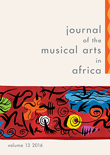
Journal of the Musical Arts in Africa
Scope & Guideline
Connecting Cultures Through the Power of Music
Introduction
Aims and Scopes
- Interdisciplinary Research in African Music:
The journal encourages research that crosses traditional disciplinary boundaries, integrating musicology with cultural studies, anthropology, and education to explore the complexities of musical practices and their societal implications. - Focus on Regional and Local Musical Traditions:
A significant emphasis is placed on the documentation and analysis of local and regional musical traditions, highlighting the diversity and richness of African music, from traditional forms to contemporary genres. - Cultural and Historical Contextualization:
The journal seeks to contextualize music within broader cultural and historical frameworks, exploring how music reflects and influences social, political, and economic dynamics in African societies. - Innovative Methodologies in Music Research:
The journal promotes the use of innovative methodologies, including qualitative analysis, case studies, and participatory research, to deepen insights into musical practices and their meanings. - Artistic Practices and Education:
Research on the intersection of artistic practices and music education is a core focus, examining how music is taught, learned, and performed within various African contexts.
Trending and Emerging
- Impact of Technology on Music Creation and Distribution:
Recent publications have increasingly addressed the role of technology in music creation and distribution, including discussions on digital music platforms and the implications of artificial intelligence in music production. - Exploration of Gender and Identity in Music:
There is a notable trend towards examining gender and identity within musical contexts, focusing on how these constructs influence artistic expression and community engagement in African music. - Cultural Relevance of Music in Social Movements:
The journal has seen growing interest in the role of music in social movements, exploring how musical practices contribute to political activism, cultural identity, and community resilience. - Contemporary African Music Education Practices:
Emerging themes in music education highlight innovative pedagogical approaches, particularly in the context of intercultural awareness and transnational perspectives in music teaching. - Indigenization and Cultural Appropriation in Music:
Research on indigenization and cultural appropriation within African music practices is gaining traction, addressing the complexities of cultural exchange and authenticity in contemporary music.
Declining or Waning
- Historical Analysis of Music Genres:
Themes centered around the historical analysis of specific music genres, such as the detailed study of traditional forms, have become less frequent, possibly due to a shift towards more contemporary and applied research in music. - Individual Artist Biographies:
The focus on individual artist biographies, while still relevant, has waned as researchers increasingly prioritize broader cultural and societal themes over singular narratives. - Conventional Ethnomusicological Approaches:
Traditional ethnomusicological approaches that rely solely on fieldwork documentation without critical engagement with contemporary issues appear to be declining, as the journal embraces more integrative and interdisciplinary methods.
Similar Journals

Problemy Muzykalnoi Nauki-Music Scholarship
Advancing Knowledge in Music Theory and CultureWelcome to Problemy Muzykalnoi Nauki-Music Scholarship, a leading journal in the field of music scholarship published by the esteemed Gnesin Russian Academy of Music. With an ISSN of 2782-358X and an E-ISSN of 2782-3598, this Open Access journal has been committed to the dissemination of high-quality research since 2009, making scholarly work accessible to a global audience. Covering diverse aspects of music theory, history, and its socio-cultural impacts, Problemy Muzykalnoi Nauki serves as an essential platform for scholars, educators, and practitioners in the arts and humanities, as well as in social sciences related to music education. While its Scopus coverage was discontinued in 2021, the journal remains influential, holding a rank of #48 in the Arts and Humanities category and a percentile of 67th, showcasing its relevance and rigor in the discipline. We invite researchers and students alike to explore the rich contributions made within these pages, fostering a deeper understanding and appreciation of music in contemporary society.

Musica Oral del Sur
Connecting Cultures Through Musicology and EthnomusicologyMusica Oral del Sur is a prominent academic journal published by the Junta Andalucía through the Centro Documentación Musical Andalucía. With its ISSN 1138-8579 and E-ISSN 2445-0391, this pioneering publication has championed open access since 1995, providing a vital platform for scholars dedicated to the exploration of traditional and contemporary oral music practices in Southern Spain and beyond. The journal is essential for researchers, professionals, and students interested in musicology, ethnomusicology, and cultural studies, promoting scholarly discourse through a rich assortment of articles, reviews, and field research. Set in the vibrant cultural landscape of Granada, the journal encourages the fusion of theoretical insights with practical implications, making significant contributions to the understanding of oral musical traditions. By fostering accessible academic dialogue, Musica Oral del Sur plays an invaluable role in preserving and highlighting the heritage of Southern musical expressions while addressing contemporary issues in the field.
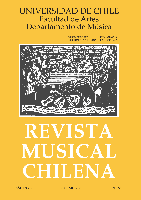
Revista Musical Chilena
Unveiling the Rich Tapestry of Chilean Musical HeritageRevista Musical Chilena, an esteemed publication from the Faculty of Arts at Universidad de Chile, has been a pivotal platform in the field of music and cultural studies since its inception in 1945. With a commitment to open access, this journal promotes the dissemination of innovative research and critical discourse that bridges the gap between cultural theory and musical practice. Holding a notable Q2 ranking in both the Cultural Studies and Music categories as of 2023, it serves as a vital resource for scholars and professionals alike. The journal's inclusion in the Scopus database, with rankings that reflect its influence in the arts and humanities, underscores its significance in shaping the contemporary landscape of music studies. Given its convergence of research output from 2007 to 2024, Revista Musical Chilena continues to engage its audience with diverse scholarship that reflects Chilean musical heritage and global cultural dynamics.

ARCHIV FUR MUSIKWISSENSCHAFT
Bridging Tradition and Modernity in MusicologyARCHIV FUR MUSIKWISSENSCHAFT, the esteemed journal published by FRANZ STEINER VERLAG GMBH, serves as a significant platform for the dissemination of scholarly research in the field of musicology. With an ISSN of 0003-9292 and an established history of publication reaching back to 2002, this journal aims to explore various aspects of music theory, history, and ethnomusicology, contributing to academic discourse within a vibrant global community. Despite its designation in the Q4 category for music in 2023, the journal continues to foster innovative research and discussions among budding musicians, established academics, and music enthusiasts alike. While Open Access options are not currently available, the journal's offerings are enriched by a thorough review process aimed at maintaining high academic standards. Located in Stuttgart, Germany, at BIRKENWALDSTRASSE 44, D-70191, ARCHIV FUR MUSIKWISSENSCHAFT is committed to engaging its readers through insightful articles and reveals the evolving landscape of music scholarship while remaining a resourceful tool for researchers and students pursuing knowledge in this captivating field.
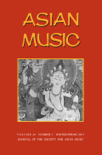
ASIAN MUSIC
Unveiling the Harmonies of Culture and Sound.ASIAN MUSIC is a distinguished academic journal published by University of Texas Press, focusing on the rich and diverse musical traditions of Asia. With an ISSN of 0044-9202 and an E-ISSN of 1553-5630, this journal serves as a key platform for interdisciplinary research that encompasses musicology, ethnomusicology, and cultural studies related to Asian music practices. While ASIAN MUSIC is not an open-access journal, it provides valuable insights and scholarly articles that contribute significantly to the understanding of music’s role within Asian cultures. The journal originally covered works from 2002 to 2010 and has a reputation for fostering discussions that celebrate the intricacies of sound, performance, and society. Targeting researchers, professionals, and students alike, ASIAN MUSIC stands as a crucial resource for those engaged in the study of music in its multifaceted context.

Studi Musicali-Nuova Serie
Charting New Territories in Music ResearchStudi Musicali-Nuova Serie is a distinguished academic journal dedicated to the field of musicology, published by the esteemed ACCAD NAZ SANTA CECILIA, FONDAZIONE. This journal serves as a platform for the dissemination of cutting-edge research and scholarly discourse surrounding various aspects of music, including historical, theoretical, and applied music studies. While the journal has contributed significantly to the field with its publication span from 2002 to 2009, it has since been recognized for its rigorous academic standards and its role in advancing knowledge in musicology. Despite its coverage being discontinued in Scopus, it continues to hold relevance among researchers, professionals, and students interested in the rich and diverse world of music. Situated in the heart of Rome, at the AUDITORIUM PARCO DELLA MUSICA, this journal embodies the vibrant cultural heritage of Italy while fostering international academic collaboration in music studies.

Revista de Musicologia
Unveiling New Perspectives in Music ResearchRevista de Musicologia is a distinguished academic journal dedicated to the exploration and analysis of musicology, published by the SOC ESPANOLA MUSICOLOGIA. Based in Spain, this journal serves as a vital platform for music scholars, researchers, and enthusiasts to share innovative insights and original research concerning various aspects of music, including historical studies, ethnomusicology, and contemporary critiques. With its ISSN 0210-1459 and a current Scopus ranking placing it in the Q3 quartile of Music studies, the journal reflects a commitment to enhancing the discourse in this rich field. Although it currently does not publish under an open-access model, it continuously aims to provide a rigorous peer-reviewed environment for contributions that engage both academic inquiry and practical applications within musicology. The Revista de Musicologia is thus an essential resource for anyone in the field looking to expand their understanding and expertise in music studies from 2016 through 2024 and beyond.

Musicologica Brunensia
Fostering Interdisciplinary Dialogue in Music StudiesMusicologica Brunensia, an esteemed journal published by Masaryk University, Faculty of Arts, serves as a significant platform for the dissemination of knowledge in the field of musicology. Based in the Czech Republic, this Open Access journal has been facilitating scholarly communication since 2009, allowing unrestricted access to its rich array of research articles. With an ISSN of 1212-0391 and an E-ISSN of 2336-436X, Musicologica Brunensia proudly holds a Q3 ranking in the Music category as of 2023, reflecting its dedication to advancing research in the arts and humanities, particularly music. The journal accepts contributions spanning diverse topics within music studies, fostering interdisciplinary dialogue among researchers, professionals, and students alike. Located at Arne Novaka 1, Brno, 60200, Czech Republic, Musicologica Brunensia is poised to continue its journey of promoting innovative scholarship in musicology until 2024 and beyond, making it a valuable resource for anyone passionate about the field.
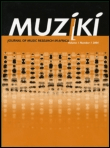
Muziki-Journal of Music Research in Africa
Fostering Dialogue Through Diverse Musical NarrativesMuziki - Journal of Music Research in Africa is a leading publication dedicated to exploring the rich tapestry of music research across the African continent. Published by Routledge Journals, Taylor & Francis Ltd, this journal has been at the forefront of scholarly discourse since its inception in 2004, providing a platform for innovative and interdisciplinary approaches to the study of music. With an ISSN of 1812-5980 and E-ISSN of 1753-593X, it ensures wide accessibility to both print and digital audiences. As of 2023, it holds a prestigious Q3 ranking in the field of Music, reflecting its commitment to quality scholarship and the promotion of diverse musical narratives. Muziki is particularly invaluable for researchers, professionals, and students seeking to deepen their understanding of African musicology and its socio-cultural relevance. The journal publishes original research articles, reviews, and critical essays, highlighting contemporary developments and historical contexts in music research. With a Scopus rank of 59/180 in the Arts and Humanities Music category, it stands as a respected source for advancing knowledge and fostering dialogue within the global music community.
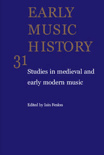
EARLY MUSIC HISTORY
Charting the Evolution of Musical HeritageEARLY MUSIC HISTORY is an esteemed academic journal published by Cambridge University Press, specializing in the rich and diverse field of early music, providing a vital platform for research and discourse since its inception. With an ISSN of 0261-1279 and an E-ISSN of 1474-0559, the journal operates from its headquarters in Cambridge, United Kingdom. Known for its scholarly rigor, EARLY MUSIC HISTORY is ranked within the Q2 category in Music, illustrating its significant contribution to the field. The journal covers a broad time frame, examining musical developments from the medieval to the early modern period, and features articles that seek to illuminate historical contexts and contemporary implications of early music practices. Despite lacking the Open Access option, it remains a valued resource for researchers and professionals seeking to advance their understanding of this dynamic area of study. The journal not only fosters a deeper appreciation of early music history but also positions itself as a pivotal contributor to ongoing academic dialogue, making it essential reading for scholars in the arts and humanities.